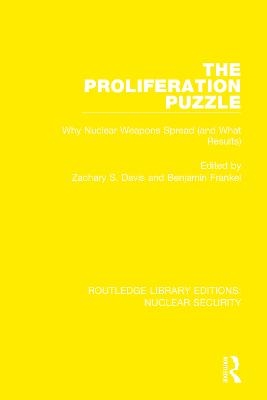
The Proliferation Puzzle
Routledge (Verlag)
978-0-367-54395-2 (ISBN)
Originally published in 1993, this volume was unique in its scope and approach: Unlike most literature on nuclear weapons proliferation at the time, the essays in this volume offer theoretical discussions and suggest testable hypotheses about the causes and effects of nuclear weapons proliferation.
The proliferation of nuclear weapons is an ideal subject for social science scholarship, and such scholarship is especially timely now. Among the topics discussed in The Proliferation Puzzle are:
The building of nuclear weapons is a complex task touching upon many of the subjects of study at the core of social science and international relations. Nuclear weapons may be acquired as a hedge against external threat, for reasons of national prestige, or as a result of pressures by domestic coalitions among scientists, bureaucrats, and the military. They may be sought for defensive purposes or to support hegemonic aspirations. Nuclear weapons also raise questions about civilian command and control, especially in crisis situations.
During the last two decades the acquisition of nuclear weapons has been proscribed by the non-proliferation regime. The decisions countries made about acquiring these weapons and the manner they chose to build them serve as a test of the efficacy of this particular regime, and of international regimes more generally.
Nuclear weapons were introduced at the time bipolarity became the international order. As the world moves away from bipolarity, there is a need to answer questions such as: What would be the effect of nuclear weapons in a multipolar order? How will the spread of nuclear weapons affect the distribution of capabilities among states? If nuclear weapons spread to additional countries, will they enhance stability or exacerbate instability? Can the spread of these weapons be managed or controlled?
This book brings together scholars from different schools within international relations and the social sciences to address the question of why nuclear weapons spread. A disciplined, rigorous examination of proliferation is important not only for scholarship but also for informed policymaking. The purpose of social science is to formulate hypotheses and devise theories that advance our understanding of society and aid in the fashioning of enlightened policy. The essays in this volume show how explicit hypotheses about the causes and consequences of nuclear weapons proliferation provide a deeper understanding of the problem and suggest specific, theory-informed policy recommendations.
Nuclear Weapons Proliferation: Theory and Policy Benjamin Frankel and Zachary S. Davis. Part 1: Realist Approaches Dividing Realism: Structural Realism versus Security Materialism on Nuclear Security and Proliferation Daniel Deudney. The Brooding Shadow: Systemic Incentives and Nuclear Weapons Proliferation Benjamin Frankel. The Realist Nuclear Regime Zachary S. Davis. Paranoids, Pygmies, Pariahs and Nonproliferation Revisited Richard K. Betts. Part 2: State-Oriented Approaches The End of the Cold War and the Future of Nuclear Proliferation: An Alternative to the Neo-Realist Perspective Glenn Chafetz. Proliferation Optimism and Theories of Nuclear Operations Peter D. Feaver. Nuclear Myths and the Causes of Nuclear Proliferation Peter R. Lavoy. Understanding Nuclear Proliferation: Theoretical Explanation and China’s National Experience Avery Goldstein. The Power of Suggestion: Opaque Proliferation, Existential Deterrence, and the South Asian Nuclear Arms Competition Devin T. Haggerty. Part 3: Four More Models The Economic and Political Incentives to Acquire Nuclear Weapons Dagobert L. Brito and Michael D. Intriligator. Forecasting the Risks of Nuclear Proliferation: Taiwan as an Illustration of the Method Bruce Bueno de Mesquita, James D. Morrow and Samuel S. G. Wu. Multilateral Cooperation and Nuclear Nonproliferation Richard T. Cupitt and William J. Long. Appendix: Technical Barriers to Nuclear Proliferation Peter D. Zimmerman. The Contributors.
| Erscheinungsdatum | 17.08.2022 |
|---|---|
| Reihe/Serie | Routledge Library Editions: Nuclear Security |
| Verlagsort | London |
| Sprache | englisch |
| Maße | 156 x 234 mm |
| Gewicht | 675 g |
| Themenwelt | Natur / Technik ► Fahrzeuge / Flugzeuge / Schiffe ► Militärfahrzeuge / -flugzeuge / -schiffe |
| Sozialwissenschaften ► Politik / Verwaltung | |
| ISBN-10 | 0-367-54395-8 / 0367543958 |
| ISBN-13 | 978-0-367-54395-2 / 9780367543952 |
| Zustand | Neuware |
| Informationen gemäß Produktsicherheitsverordnung (GPSR) | |
| Haben Sie eine Frage zum Produkt? |
aus dem Bereich


